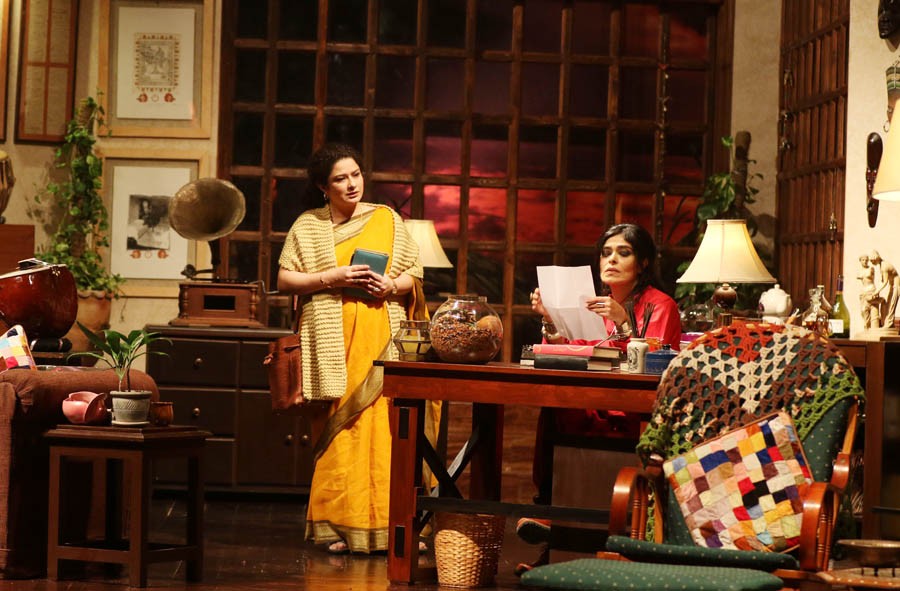
With the mounting of Mushk, Olomopolo proved its claims of showcasing a unique experience to theatre audiences in Pakistan

For the past few weeks, Lahorites had been hearing much about a play called Mushk. There were interactive discussions at every major university; constant publicity through social media of beautifully curated photographs of the lead actors; and even an original background score. Yet, no one quite knew what the play was about except that it would be bringing two of Pakistan’s best theatre actors to stage -- Nimra Bucha and Sania Saeed.
In hindsight, the marketing strategy by Olomopolo of not providing clues to the storyline and enveloping the play in a mysterious shroud was perfectly in sync with the play. Mushk is not a thriller, though it had suspense in ample measure. Neither is it an entertainer in the manner of comedies of error that are the usual fare for Pakistani theatregoers. The Olomopolo team billed their production as an ‘experience’ that would shake the perceptions of Pakistani theatre audiences. For once, such tall marketing claims do appear to be justified after watching the two-hour long Urdu-language play.
Mushk pulled crowds on the strength of its female lead actors. It turns out they are not just the stars of the show but actually the show. Mushk is the snapshot of a fateful night in the lives of two women, a denouement in the unknowingly interlinked stories of their lives. A third character does exist, that of the absent Gohar Hayat -- the man whose affiliation to both women is the central premise of the story -- yet the audience is never told much about him. He is presented as a memory of the two women, remaining in the shadows as a man who might have been more, or less, but whose personality and character are overshadowed by the strange tableau unfolding between the characters of Sophia and Zoay onstage.
Directed by Kanwal Khoosat and written by Raabia Qadir and Seemal Numan, the plot revolves around Sophia Noor, an arrogant and eccentric writer played by Nimra Bucha, and Zoay, a small-town journalist portrayed by Sania Saeed. The tastefully arranged elaborate set depicting the interior of an affluent writer’s house, done by Iram Sana, is the scene of action.
Interestingly, while the play essentially derives its momentum from the verbal exchange between the two women, there is a lot of action. Both characters pace across the room in turns, expressing their anger, agitation, discomfiture and resignation through their walk. Bucha, in particular, showcases her character’s volatile personality by constantly altering her proximity to her interviewer.
Throughout the play, Bucha’s character towers over Saeed’s, the overbearing intensity and melodrama dwarfing Zoay’s pacifying character. The red kaftan paired with clunky trekking boots, the long loose locks, and the hunting rifle -- all symbolise Sophia’s deliberate disdain for culturally defined roles. It comes as a surprise then, when it is demure sari-clad Zoay who constantly turns the story on its head, leaving the audience more intrigued about her character at the end than about anything else.
It is apparent from the beginning that Zoay has come to the high-mountain retreat of the famous Sophia and find her big break through an exclusive scoop on the reclusive writer’s life. An undercurrent of antagonism is palpable from the start, with Bucha deriding Zoay’s middle-class sensibilities as she tries to deflect Zoay’s probing questions. Her fear of revealing too much to the journalist is at odds with her flamboyant personality -- till Zoay exposes it as a facet of fear.
Fear, loneliness, and death, in literal and metaphoric forms both, are the overarching themes of the plot. Like the protagonist, the script tests the limits of socio-cultural norms, pushing the audience to question their own understanding of these universal realities. But it does not stop there. The plot thrives on duality. Reality and illusion all become subjective as Zoay and Sophia stun each other with their revelations. The parable of the deer and its futile search for the musk pod narrated by the characters towards the end is a very apt description of the story’s progression. What appears to be truth at the start has been unravelled by the end to make the audience stretch their acceptance of gender roles and relationships in our society.
Mushk ends without lending a catharsis to its audience. There are no neatly wrapped up ends that bring closure to the surprised audience. It is left to the audience to decide how they want to process the different perspectives that are suggested by the play.
All claims to showcasing a unique experience to theatre audiences in Pakistan could have been dismissed as overconfidence by the production team had the overwhelming majority of the audience not been echoing those words at the end of the play. A packed hall on the second day, a standing ovation, and not a single disgruntled viewer scandalised by the implied unconventional lifestyles adopted by the two women is a big accomplishment for a theatrical production. The script, the acting, and the direction together seem to have pulled off their mission of creating a watershed for Pakistani theatre quite successfully.